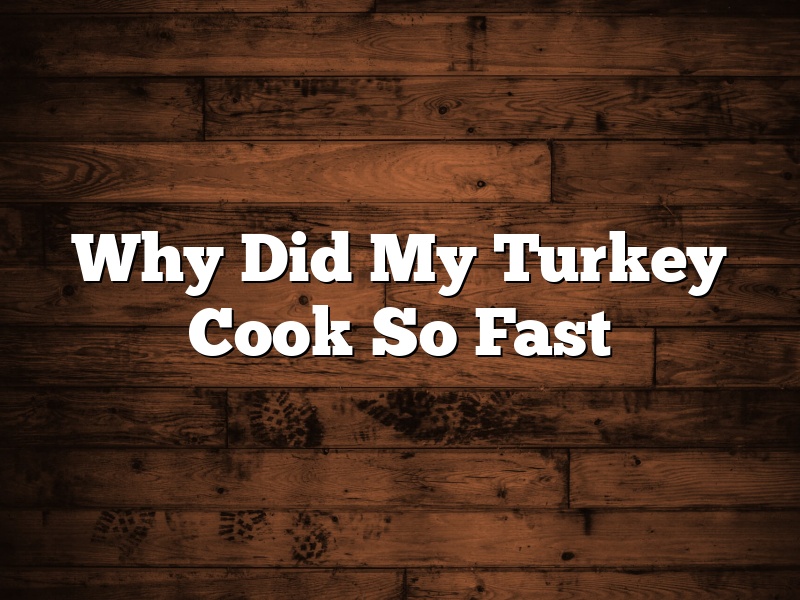As Thanksgiving approaches, roasting a turkey is one of the most anticipated traditions. After thawing the frozen bird, preparing the aromatics, and popping it in the oven, you eagerly wait for the allotted cook time to pass before carving into juicy, tender meat. But what if halfway through, you discover your turkey is already at temp? Let’s explore some common causes and solutions for a too-rapidly roasting turkey.
Estimating Turkey Cook Times
To understand why your turkey cooked unusually fast first let’s review standard cook times. The general rule of thumb is to roast at 325°F and calculate 15-18 minutes per pound for an unstuffed turkey. For example a 12 lb turkey should take 3-3.5 hours.
Stuffing adds insulation, slowing cooking so add 30 minutes if stuffed. Higher oven temperatures also accelerate cooking. And every oven runs a bit differently so exact cook times can vary.
Common Reasons for a Fast Cook
If your turkey cooked way faster than expected, here are some potential factors:
-
Smaller Bird – A smaller 10 lb turkey may only need 2-2.5 hours if cooked at a high 350°F temp. Don’t rely solely on pound calculations.
-
High Oven Temp – Cooking above 350°F dramatically decreases cook time. Dropping to 325°F could’ve added an extra 45+ minutes.
-
Stuffing Removed – No stuffing also speeds cooking. The stuffing insulates the meat, slowing interior cooking.
-
Forgot to Thaw – A frozen turkey can take 50% longer. But if you forgot to thaw and cooked frozen, it cooks very rapidly.
-
Cooking Multiple Birds – Stacked racks radiate heat, cooking birds faster. Spread them out with empty racks between.
-
Oven Runs Hot – If your oven consistently cooks fast, you may need to set temp 25°F lower than the recipe states.
-
Small Oven – Turkeys in smaller ovens often cook quicker with surrounding heat. Use thermometer, not times.
Solutions for a Too Fast Cook
If you discover your turkey is approaching temp prematurely, don’t panic. Here are some good solutions:
-
Lower the temp to 300°F. The bird will cook slower. Tent with foil to prevent drying out.
-
Remove turkey, tent with foil, and let rest while finishing side dishes. It will hold for 1-2 hours.
-
Place turkey in a cooler wrapped in towels to keep warm for several hours if done way early.
-
Return legs/thighs to oven if they undercook while breast overcooks. Cook to 165°F.
-
Cook thighs/legs in broth if they require more time. This moist method cooks quickly.
-
Make gravy to add moisture and flavor to any dried-out meat. Or serve with giblet gravy or sauce.
-
Slice breast meat and tent in foil while legs finish. Then reassemble for presentation.
-
Turn leftovers into recipes like sandwiches, soups, casseroles. Moisture in recipes helps tenderize.
Preventing a Fast Cook Next Time
To avoid a rushed turkey in the future, keep these tips in mind:
-
Accurately check turkey’s weight and thaw completely before cooking.
-
Review oven manual to see if it runs hot. Adjust temp down 25°F if needed.
-
Cook stuffed turkey at only 325°F max. For unstuffed, 350°F is ideal.
-
Use a leave-in thermometer to monitor doneness instead of total time. Cook to 165°F thigh meat.
-
For stuffed turkey, err on the side of undercooking a bit, then finish carving.
-
Cook multiple birds on separate oven racks with empty racks between.
-
Place foil tent over breast areas to slow cooking if needed.
-
Factor in carryover cooking – internal temp may rise 5-10°F after removing turkey from oven.
Enjoying Leftovers from a Fast Cook
Even if the turkey finishes early, you can still enjoy delicious leftovers after the holiday. Here are some tasty ways to repurpose your sped-up bird:
-
Slice or shred meat to create turkey sandwiches with cranberry sauce and stuffing.
-
Dice turkey to make comforting casseroles like turkey tetrazzini or turkey pot pie.
-
Use shredded turkey in chilis, soups, burritos, tacos, empanadas, etc. Moisture helps tenderize.
-
Mix diced turkey with gravy and stuffing for next-day turkey salad.
-
Cut turkey into pieces to sauté with vegetables and make healthy stir fries.
So while an accelerated roasting time may result in drier meat, don’t let it ruin your holiday! With smart solutions and creative leftover recipes, you can still enjoy a beautiful and delicious Thanksgiving turkey.

The Problem: The Turkey Is Frozen Solid
The only effective way to thaw a turkey is by submerging it in cold water. Only cold water will keep bacteria from growing out of control. Now by cold, we mean 40 F/5 C. Any warmer and bacteria will grow. Plan on 30 minutes per pound—in short: if you need to get a 22-pound turkey defrosted, you wont be eating it until tomorrow. Since the water temperature can be 40 degrees F, keep it there. Put a thermometer in the water and add warm or cold water to keep the temperature where you want it.
No time to thaw the turkey? It IS possible to cook a turkey that is still frozen. It isnt ideal, but you will be able to save the meal. 1:20
Turkey Emergency Toolkit
There are a few things you need to have on hand as part of your turkey emergency kit. These items will be necessary at the last minute so you better make sure you are prepared.
- An accurate meat thermometer
- Lots of heavy-duty aluminum foil
- Lots of chicken or vegetable stock (low sodium preferred)
- Spray bottle
- Gravy mixes
Why turkey is hard to cook
FAQ
What to do if your turkey cooks too quickly?
What makes a turkey cook faster?
What if my turkey is browning too quickly?
